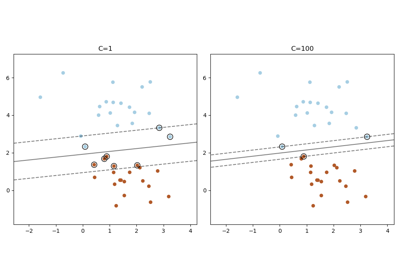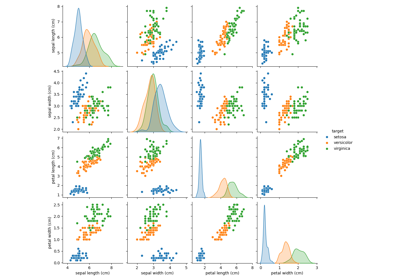注意
前往末尾 下载完整示例代码。或通过 JupyterLite 或 Binder 在浏览器中运行此示例
在鸢尾花数据集上绘制不同的 SVM 分类器#
在鸢尾花数据集的二维投影上比较不同的线性 SVM 分类器。我们只考虑该数据集的前 2 个特征
花萼长度
花萼宽度
此示例展示了如何为四种具有不同核的 SVM 分类器绘制决策边界。
线性模型 LinearSVC() 和 SVC(kernel='linear') 会产生略微不同的决策边界。这可能是由于以下差异造成的
LinearSVC最小化平方合页损失,而SVC最小化常规合页损失。LinearSVC使用一对多(也称为 One-vs-Rest)多类别降维,而SVC使用一对一多类别降维。
两种线性模型都具有线性决策边界(相交超平面),而非线性核模型(多项式或高斯 RBF)则具有更灵活的非线性决策边界,其形状取决于核的类型及其参数。
注意
虽然为玩具二维数据集绘制分类器的决策函数有助于直观地理解它们各自的表达能力,但请注意,这些直觉并非总能推广到更真实的高维问题。

# Authors: The scikit-learn developers
# SPDX-License-Identifier: BSD-3-Clause
import matplotlib.pyplot as plt
from sklearn import datasets, svm
from sklearn.inspection import DecisionBoundaryDisplay
# import some data to play with
iris = datasets.load_iris()
# Take the first two features. We could avoid this by using a two-dim dataset
X = iris.data[:, :2]
y = iris.target
# we create an instance of SVM and fit out data. We do not scale our
# data since we want to plot the support vectors
C = 1.0 # SVM regularization parameter
models = (
svm.SVC(kernel="linear", C=C),
svm.LinearSVC(C=C, max_iter=10000),
svm.SVC(kernel="rbf", gamma=0.7, C=C),
svm.SVC(kernel="poly", degree=3, gamma="auto", C=C),
)
models = (clf.fit(X, y) for clf in models)
# title for the plots
titles = (
"SVC with linear kernel",
"LinearSVC (linear kernel)",
"SVC with RBF kernel",
"SVC with polynomial (degree 3) kernel",
)
# Set-up 2x2 grid for plotting.
fig, sub = plt.subplots(2, 2)
plt.subplots_adjust(wspace=0.4, hspace=0.4)
X0, X1 = X[:, 0], X[:, 1]
for clf, title, ax in zip(models, titles, sub.flatten()):
disp = DecisionBoundaryDisplay.from_estimator(
clf,
X,
response_method="predict",
cmap=plt.cm.coolwarm,
alpha=0.8,
ax=ax,
xlabel=iris.feature_names[0],
ylabel=iris.feature_names[1],
)
ax.scatter(X0, X1, c=y, cmap=plt.cm.coolwarm, s=20, edgecolors="k")
ax.set_xticks(())
ax.set_yticks(())
ax.set_title(title)
plt.show()
脚本总运行时间: (0 分 0.201 秒)
相关示例




